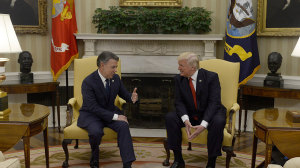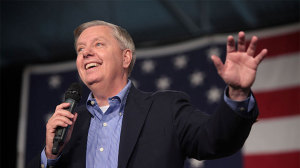Christof Lehmann (nsnbc) : Colombian President Juan Manuel Santos visited his U.S. counterpart Donald Trump at the White House, pleading for support for Colombia’s peace process. Trump, for his part, ignored the peace process and stressed that the situation in Venezuela is more important. Meanwhile, Republican Party Senator Lindsey Graham pushed for a military line against Venezuela.
In one of the most awkward press conferences at the White House since the inauguration of President Donald Trump, Colombian President Juan Manuel Santos and President Donald Trump, sitting only feet apart from each other, appeared to talk about different worlds and universes. Santos had come to the United States, among others, to seek U.S. support for the peace process in Colombia.
However, Trump neither endorsed nor even mentioned Colombia’s peace process except in a brief comment after a journalist pushed for an answer. Santos had come to Washington hoping to get an explicit endorsement of Colombia’s peace process as well as support to effect a change in the United States’ drug policy. Trump utterly ignored both issues. Instead, Trump talked about Colombia’s neighbor Venezuela, central American criminal groups, and the wall he has promised to build along the US-Mexican border.
Ignoring the now 53-year-long civil war in Colombia with its 265,000 dead and 7 million displaced, Trump claimed that violence seen in Venezuela had not been seen in the hemisphere in decades. It was only after a journalist pushed Trump for a comment that he tentatively congratulated Santos for his “tremendous job” while he reiterated that Venezuela, and not Colombia, is a priority of his administration’s foreign policy.
 Santos, visibly disappointed, highlighted the contradictory policies in bilateral relations and the prospect of a future with relations between the USA and most Latin American countries where Trump is widely loathed. When asked about his opinion about Trump’s plans to build a wall on the U.S. – Mexican border, Santos said economic development in Latin America was the answer to transnational crime including drug trafficking in the hemisphere.
Santos, visibly disappointed, highlighted the contradictory policies in bilateral relations and the prospect of a future with relations between the USA and most Latin American countries where Trump is widely loathed. When asked about his opinion about Trump’s plans to build a wall on the U.S. – Mexican border, Santos said economic development in Latin America was the answer to transnational crime including drug trafficking in the hemisphere.
The meeting between Santos and Trump did not mitigate months of ambiguity in bilateral relations. Trump had promised to cut foreign aid across the bord. Trump who had previously also raised questions about promised U.S. aid earmarked for Colombia’s peace process did not make any unambiguous statement in that regard. Trump did not signal any clear position with regard to drug policies and what is widely described as the United States’ failed “war on drugs”.
Both Santos and Trump pledged their commitment to the fight against drug trafficking. However, their respective approached and policies diverge and in part oppose each other. Neither Santos nor Trump signaled readiness to change policies. Colombia decriminalized drug use and possession of minor amounts years ago. Colombia also stopped the US-endorsed aerial fumigation of coca crops after major domestic resistance and a World Health Organization (WHO) report indicating the pesticide delivered by the US-based multinational Monsanto, containing glyphosate, could be carcinogenic.
Opposed to Colombia’s policy, US Attorney General Jeff Sessions is attempting to revive a hardline approach to the failed war on drugs. Sessions has been directing prosecutors to seek harsher sentences for drug and drug-related crimes. Sessions also threatened to enforce federal laws against medical marijuana, and opposing numerous justice reforms that have gained widespread bilateral support at the states level.
The UN Mission in Colombia, for its part, implicitly urged the administration of President Santos to ignore the policies of the Trump administration by explicitly endorsing Colombia’s illicit crop substitution program and to ignore calls for the reintroduction of coca fumigation.
The UN Mission agreed that the crop substitution program was an important part of the peace process and of Colombia’s sustainable and socially just economic development. The UN Mission also noted that Santos’ current peace policy, as “proven” strategies to curb both coca cultivation and drug trafficking.
Who cares about peace in Colombia when we can have a war against Venezuela
Trump’s apparent “who cares about peace in Colombia when we can have a war against Venezuela” attitude was underpinned by U.S. House Speaker Paul Ryan and U.S. Senator Lindsay Graham. Santos visited the Capitol for talks with Senators before he met Trump at the White House. Contrary to receiving explicit support for peace in Colombia, Santos was met with militarism directed against Venezuela with Colombia serving as springboard.
U.S. House Speaker Paul Ryan said “We reaffirmed our commitment to a strong bilateral relationship between the United States and Colombia, and our support for their government’s counter narcotics efforts. We look forward to working with President Santos to build on the progress our countries have made over the past two decades, including the free trade agreement implemented in 2012.”
Even more overt in his militarism, Republican party leader and U.S. Senator Lindsay Graham reportedly sought Santos’ approval to deploy US military resources to Colombia’s border with Venezuela amid an increasingly explosive political crisis in the neighboring country. Graham told reporters he had asked Santos “what can we do to help the Colombian armed forces so that they can deter a Venezuelan provocation, because I don’t believe Russia and China will want to promote democracy in that country.”
Senator Graham also said “I believe the best deterrent is to strengthen the defense of the Colombian armed forces. I will work with President Santos to determine what is necessary to prevent a war through dissuasion and, if a conflict does occur, make sure Colombia has how to defend itself against the Venezuelans.”
It is worth mentioning that the presence of U.S. troops in Colombia is highly controversial, and even more so now while Colombia is working on the immensely difficult task to end the over half a century long civil war. This is even more so, because U.S. military personnel and contractors have been involved in numerous crimes including rape, sexual abuse of minors, killings, and, arguably, war crimes, while no U.S. citizen will have to stand trial before Colombia’s transitional justice system.
CH/L – nsnbc 19.05.2017
Source Article from https://nsnbc.me/2017/05/19/u-s-ignores-colombias-peace-process-pushes-militarist-line-against-venezuela-instead/
Related posts:
Views: 0
 RSS Feed
RSS Feed















 May 19th, 2017
May 19th, 2017  Awake Goy
Awake Goy 













 Posted in
Posted in  Tags:
Tags: 
















